by Mayumi-H | May 30, 2012 | Excerpts, Fearless, Process
What is it about us writers, that we put our beloved characters through an emotional wringer?
Ross has his share of lucky, happy moments, but he’s got to deal with a lot of heavy seriousness, too. Here’s an excerpt from (the recently-rewritten) Chapter 11, that always touches me a little:
Ross walked into her room, to find Amber still asleep, just as Sam had said. Still propped up by the thick, confining torso brace moulded around her, to keep her back in position. Still hooked up to those tubes and monitors he hated. And yet, despite all of that, still so lovely, like the faery tale sleeping beauty whose story she’d once told him was her favourite.
He blinked; the thought was ridiculous. But that didn’t stop him from bending close, to press a kiss to the ridge of her cool brow, his heart pattering with anxious hope.
She didn’t wake.
Not that he’d really thought she would, because that would have been mad. But it brought a low smile to his lips anyway, and he kissed her again, leaving her with a promise for tomorrow.
I’ve always enjoyed writing parallels in my stories. In my last big story, one of my favorite moments was a retelling of the Orihime/Hikoboshi myth, as it related to my two protagonists. For this story, there’s a throwback to Brier-Rose, or Sleeping Beauty.
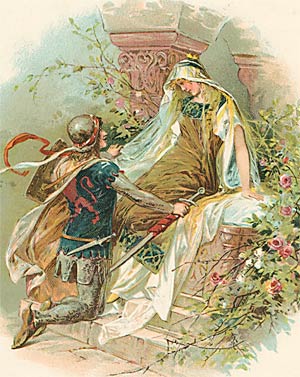
I think faery tales and folklore are a charming way to draw parallels to situations in modern tales. Do you use classical stories references in your own work? How? Why?
by Mayumi-H | May 19, 2012 | Process, Uncategorized
Just like with any skill, editing takes practice.
The first words from my pen tend to paint detailed pictures, which can sometimes be nice to read…but it does nothing for the story. It’s just a lot of background filler that takes up space, and unnecessarily so.
Writing challenges that require me to stay to a low wordcount have made me think about the use of my words, and how to give them more impact, since I have to do more with less. Now, I’m not as good as some people out there (and I still enjoy creating a well-imagined world), but I think I’m starting to get the hang of this.

Here’s a little science fiction piece I wrote a while ago, about a group of stowaways.
Take one, 521 words:
Lelie curled her fingers around the edge of the cargo hold door and gently swung it open.
“What do you see?” Tyc whispered from behind her.
Lelie craned her head around and shushed him. As she turned back to the hold, she held her breath.
It was a wide, open room, about as big as the old galley at the Institute. Metal hold containers lined all four walls, and with the exception of a few emergency lights along the stairs and floor, the hold was completely dark, a thankful allowance given their predicament.
She crept out of the container and, with one finger pressed to her lips to remind them to be quiet, she beckoned her companions forward.
Short, compact Tyc came out first, peering around from behind those over-sized goggles that helped pilots focus in Darkspace. The eyewear was usually connected to a navigation computer, projecting a heads-up display of vehicle location and statistics to the wearer, but without a precious computer (or ship, for that matter), the goggles were essentially just a trapping. Tyc still wore them, though. Bred as a long-haul pilot, he would have felt naked without them.
Lithe Imien was next, her fingers stretched out before her, the subtle electro-receptors along her skin glowing faintly in the dim light. She stepped lightly, her bare feet noiseless against the metal floor. She cocked her head to the side. “I can feel the engine – it’s about two levels below us. I’ll need a map for anything more.” She turned to Lelie and blinked, uselessly. The cipher had been blind since birth: all the better to open her peripheral senses to the programming of being a sensitive.
Stoll was last from the container, cracking his neck as he stood to his full height. Bio-engineered to be a soldier, he was both tallest and broadest among them. Even at the end of adolescence, he was all sinewy muscle, without hint of the age or paunch of the guards at the Institute. He was also the most capable in a fight, should things come to that.
“Just find me a gun,” he muttered to Imien.
Lelie shook her head. “No. No guns.” She took a step toward Stoll. “You promised.”
Stoll leaned toward her, dropping his voice further. “Lel, I can’t protect us without something to use as a weapon.”
“No guns,” Lelie repeated, emphatic. She raised both of her smooth, slender hands in a warding-off gesture. She straightened. She was not as tall as he was, but she had presence; all concubines did. “I want to be a Substantive as much as you do,” she murmured. “But the only thing guns will get us is killed.” She looked beneath the dark hair in front of his eyes. “I didn’t risk everything to get out of the Institute just to be shot on a nameless cargo freighter, did you?”
Stoll glanced away, unable or unwilling to hold her gaze. He might have been able to snap her neck with a single quick motion, but there were still some ways that she was stronger than him, and they both knew it.
“Well,” he said. “We can’t stay here.”
It’s all right. I mean, I don’t think it’s utter dreck; there are a few little nice bits in there that could be fleshed out to create something pretty cool. But it plods, and doesn’t go anywhere, quickly or slowly.
Now, here’s take two (365 words).
The ship was quiet. Save for the skeleton shift on the bridge, there was no movement, no talk, no breath.
Or, there shouldn’t have been.
In the hold below decks, close to the engine, one cargo container creaked, shifted, and then burst open, its door clattering to the metal floor.
“Quiet!” Lelia hissed as she crept from the container, pressing a finger to her lips.
Short, compact Tyc was first behind her. “Doesn’t matter,” he muttered. “We’ve already shifted into Darkspace.”
Lelia looked at him. “How can you tell?”
He peered up at her from behind his oversized pilot’s goggles, his snub nose curling in something like disdain. “Can’t you feel it?”
“He’s right,” Imien said, as she stepped from the container, too, her fingers outstretched before her. The electro-receptors along her skin glowed, like the lines of emergency lighting beneath their feet. “Engines are running hot.” She turned hear head toward Lelia, too, and blinked, uselessly. “Is there a comm panel nearby?” she asked. “It should have a map I can download.”
Stoll was last from the container, and he cracked his neck as he stood to his full height. “Just find me the armory,” he said. A rotation of shoulders made another cracking sound. “I need a gun.”
Lelia shook her head. “No!” she said. “No guns. You promised.”
Stoll leaned toward her, dropping his voice. “Lel, I can’t protect us without a weapon-”
“No guns,” Lelia repeated. She wasn’t nearly as broad as he was, nor even as tall, but she had presence; all of her kind did.
She laid her hands on his chest, looking at him but speaking to all of them. “The only thing guns will get us is killed,” she said. “I didn’t risk everything to get away from the Institute just to get shot on a cargo freighter. Did you?”
There was no answer from Tyc, or from Imien; both of them knew better than to get between the paramour and soldier.
At last, Stoll glanced away. He could snap her neck in an instant…but she was still right, and he knew it.
“Well,” he rumbled as he pushed past her. “We can’t stay here.”
You see what I’m saying? I tell the same moment, with the same pertinent details, but taking out all of that useless explanation makes the whole thing move at a quicker pace. Not fast, yet, but quicker. (It still needs a lot of work.) Nonetheless, it’s a good exercise, to learn what you can cut and still get your story across.
What lessons have you learned from editing your own work?
by Mayumi-H | May 16, 2012 | Short Stories
 The prompt for this week’s 100-Word Challenge for Grown-Ups (week 42):
The prompt for this week’s 100-Word Challenge for Grown-Ups (week 42):
You are to write a piece with these words in it:
LIBERTY EMPIRE APPLE YELLOW ENORMOUS
I’ve been trying to stretch my writing muscles with these, lately, so I decided to see if I could write a bit of action, this time around.
“Liberty and Death”
Fin shoved her ahead, and Cora slipped, across mossy stones slick as rotted apple pulp. But still she ran, the clangor of metal and voices chasing after:
“Retrieve the princess! Death to the Empire!”
Until, suddenly, there was no passageway left.
She spun, but her warning died in her throat. For spilling at her feet was Fin, broken and bloodied, his spear clattering beside.
Cora’s body shuddered.
Her pursuers were ready for a girl, a monarch’s delicate daughter. They weren’t ready for the angry, yellow-eyed monster that rose, enormous, before them.
“Here is your liberty!” it bellowed, spewing liquid fire.
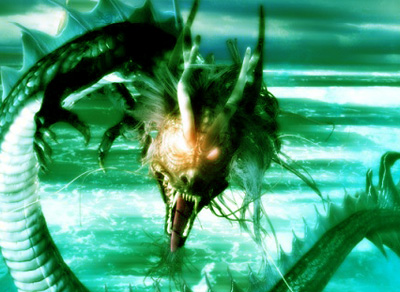
Do not piss this girl off.
For some reason, this prompt made me think of revolutionaries and rebels. The problem with revisionist history, though, is that, most of the time, you don’t get to see the other party’s point of view.
This doesn’t necessarily follow any kind of conceived timeline or history for the Fin and Cora characters, by the way. I’m just spitballing ideas, here, seeing what – if anything – works.
How did you fulfill this week’s prompt?
by Mayumi-H | May 12, 2012 | Process
I was going to spend this entry talking a little bit about self-edits, but I’ll save that for another time.
Instead, I thought I’d share a link to this post from over at The Red Pen of Doom, wherein Mr. Guy takes his titular pen to my entry to Ms. Joey’s Spring Into Action Flash Fiction contest from a few weeks back. Go take a look, and learn from his edits and comments. Don’t worry; it’s totally safe (Ms. Joey made us keep things PG).
Pretty darn slick, huh?
Now, if you’re like me, you probably get very nervous when you post anything original, because you’re putting yourself out there for anyone to mock. But, in this case, I remembered that one of the main points of my current novel project is overcoming fear, so I made myself submit that flash fiction piece.

“Aaah! What have I done?!”
The result? I had a lot of fun stretching writing muscles I hadn’t exercised in a while (namely, writing adventure). Even better, though: now, not only do I feel very honored to be made an example of by Mr. Guy, but I think I have a better idea of how to write that potential story!
The moral of this very short anecdote is, don’t be afraid to put yourself out there. Even if it’s just something small. You never know who might be reading.
Remember, it’s up to you to beat down those trolls who tell you you can’t do it!
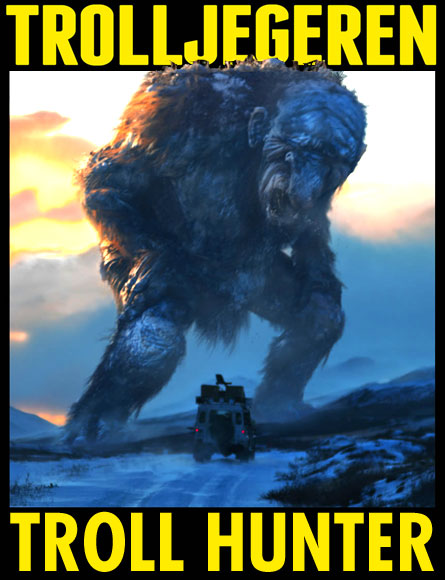
Trollhunter. Find him. Watch him. Learn from him.
by Mayumi-H | May 9, 2012 | Short Stories
 We’re up to the 41st week in the 100-Word Challenge for Grown-Ups series! This week’s prompt is from the picture below. (Do be sure to check out some of the other entries, while you’re over there!)
We’re up to the 41st week in the 100-Word Challenge for Grown-Ups series! This week’s prompt is from the picture below. (Do be sure to check out some of the other entries, while you’re over there!)
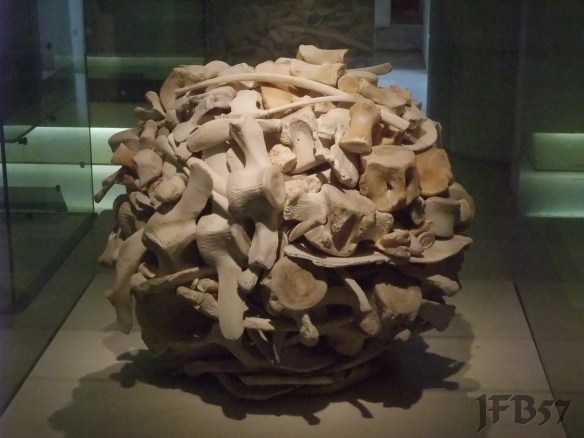
Old bones exhibit in the National Museum of Scotland.
Photo by Julia Skinner
I have to admit that I originally took the prompt to be “bones,” and so wrote something a little bit different. But, with a modicum of tweaking, I think I was able to make this story fit. What do you think?
“One Last Leap”
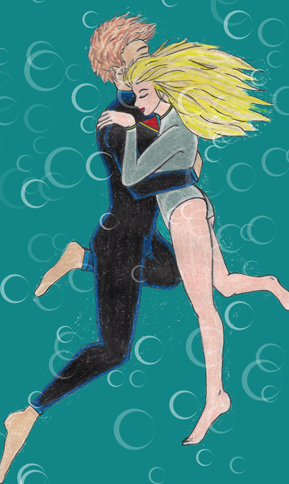
Another doodle-y doodle
Tomorrow, the cloud prince would come. To take her away from the sea, the only life she’d ever known. And the only love.
With naked toes grasping the bluff’s edge, Cora shook her head. Tomorrow, she’d be dead.
A better fate than any mountain palace was the wave-tossed tomb below. There, in that watery hollow of forgotten bones, she’d first felt Fin’s forbidden kiss, and known she’d never love another. She wished him here, if only to feel him one last time.
But she couldn’t wait. Tomorrow was coming.
Closing her eyes, she stepped free…and heard him call her name.
Revisiting Cora and Fin, here, from another short fiction attempt. I changed Cauda’s name to Cora, because it, too, has a relation to water (in Scottish, it means “seething pool,” which is appropriate for her character). And, because it’s easier to pronounce. (I liked the look of “Cauda,” but even I had trouble keeping straight the pronunciation.)
I also don’t want to create a precedent for myself, adding drawings to these flash fiction stories, but I had to try my hand at an underwater moment, since I’m struck by the beauty of it so.









Recent Comments
The Real Person!
Author Mayumi-H acts as a real person and passed all tests against spambots. Anti-Spam by CleanTalk.
The Real Person!
Author Mayumi-H acts as a real person and passed all tests against spambots. Anti-Spam by CleanTalk.